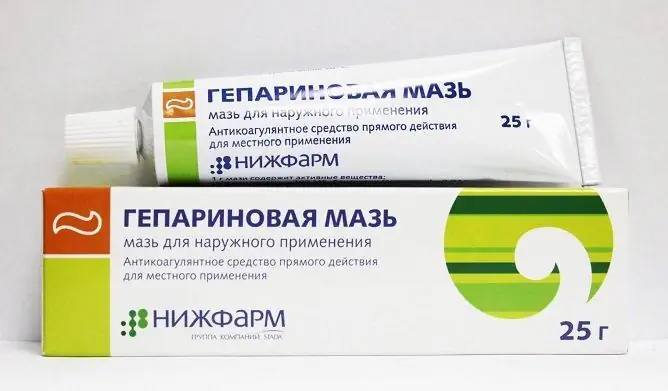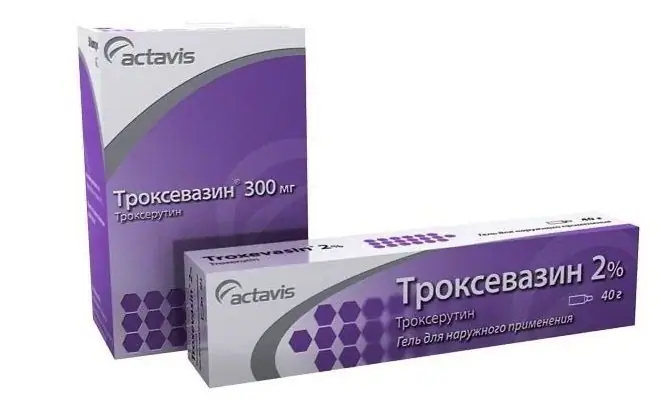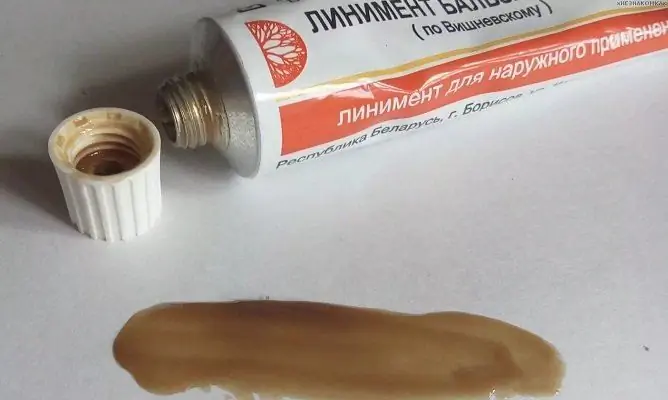- Author Rachel Wainwright wainwright@abchealthonline.com.
- Public 2023-12-15 07:39.
- Last modified 2025-11-02 20:14.
Yodomarin
Iodomarin: instructions for use and reviews
- 1. Release form and composition
- 2. Pharmacological properties
- 3. Indications for use
- 4. Contraindications
- 5. Method of application and dosage
- 6. Side effects
- 7. Overdose
- 8. Special instructions
- 9. Application during pregnancy and lactation
- 10. Drug interactions
- 11. Analogs
- 12. Terms and conditions of storage
- 13. Terms of dispensing from pharmacies
- 14. Reviews
- 15. Price in pharmacies
Latin name: Iodomarin
ATX code: H03CA
Active ingredient: potassium iodide (potassium iodide)
Producer: Berlin-Chemie AG (Menarini group), Germany
Description and photo update: 2019-16-08
Prices in pharmacies: from 114 rubles.
Buy

Iodomarin is a drug that compensates for iodine deficiency in the prevention and treatment of thyroid diseases.
Release form and composition
Dosage form - tablets Iodomarin 100 or Iodomarin 200: white or almost white, have a round flat-cylindrical shape, with a chamfer and a dividing line on one side (0.1 mg each - 50 or 100 pcs. In bottles, in a cardboard box 1 bottle; 0.2 mg - 25 pcs. in blisters, in a cardboard box 2 or 4 blisters).
The active substance is potassium iodide, in 1 tablet - 0.131 or 0.262 mg, which corresponds to the content of 0.1 or 0.2 mg of iodine.
Auxiliary components: lactose monohydrate, colloidal silicon dioxide, gelatin, basic magnesium carbonate, magnesium stearate, sodium carboxymethyl starch (type A).
Pharmacological properties
Pharmacodynamics
Iodomarin is a drug for the prevention and treatment of thyroid diseases. The active ingredient, iodine, is a vital trace element for the human body, without which it is impossible to ensure the normal functioning of the thyroid gland. This gland produces hormones that regulate the work of the heart, brain, vascular and nervous systems, ovaries and mammary glands in women, testes in men, are responsible for the correct course of metabolic processes in the body (including proteins, fats and carbohydrates), are actively involved in energy metabolism, are responsible for the normal development and growth of the child.
The use of Iodomarine compensates for the iodine deficiency in the body when it is insufficiently supplied with food, which is especially important during pregnancy and lactation, in childhood, as well as for residents of geochemical zones with poor iodine water and soil.
Provided it enters the body in physiological amounts, iodine normalizes the size of the thyroid gland, the ratio of thyroid hormones T3 and T4, as well as the level of thyroid-stimulating hormone in children or young adults.
Pharmacokinetics
After oral administration, iodine is almost completely absorbed in the small intestine, after which it is distributed in the intercellular space for 120 minutes and accumulates in the thyroid gland, mammary and salivary glands, stomach, kidneys.
Plasma concentration after taking a standard dose is 10-50 ng / ml. The concentration of iodine in saliva, gastric juice and breast milk is 30 times higher than its content in blood plasma.
The thyroid gland contains 75% of the total iodine in the body (10-20 mg).
Iodine is eliminated from the body mainly in the urine, to a lesser extent - with the contents of the intestines and lungs.
Indications for use
The use of the drug is indicated for the prevention and treatment of thyroid diseases:
- Therapy of diffuse euthyroid goiter, which developed against the background of iodine deficiency in the body of patients under the age of 40, including children and adolescents;
- Prevention of endemic goiter, especially in women during pregnancy and breastfeeding, in children and adolescents;
- Prevention of recurrence of pathological enlargement of the thyroid gland after completion of the course of treatment with thyroid hormones or after surgical removal of the goiter.
Contraindications
- Toxic adenoma of the thyroid gland;
- Nodular goiter (only for use at a dose of more than 0.3 mg of iodine per day, not including the period of iodine therapy for blockade of thyroid function in preparation for surgery);
- Hyperthyroidism, if its development is not associated with acute iodine deficiency;
- Dühring's dermatitis herpetiformis in elderly patients;
- Hypersensitivity to iodine.
It is necessary to avoid the appointment of Iodomarin when treating with radioactive iodine, diagnosed with thyroid cancer or if it is suspected.
Instructions for the use of Iodomarin: method and dosage
The tablets are taken orally after meals and washed down with a sufficient amount of liquid. Children are advised to give the drug, previously dissolved in juice or milk.
The dose and period of use of the drug is prescribed by the doctor based on clinical indications.
Recommended dosage:
- Treatment of euthyroid goiter: patients under 18 years of age, including newborns: 0.1-0.2 mg of iodine per day; from 18 to 40 years old: 0.3-0.5 mg of iodine per day. The treatment period for newborns is usually 2-4 weeks, for patients older than 1 year - 6-12 months, and if necessary, a longer admission is possible;
- Prevention of endemic goiter: children under 12 years old, including newborns: 0.05-0.1 mg of iodine per day; patients over 12 years old: 0.1-0.2 mg of iodine per day; women during pregnancy and breastfeeding: 0.2 mg of iodine per day;
- Prevention of recurrent goiter: 0.1-0.2 mg of iodine per day.
Prophylactic use of Iodomarin can last for several years, and if clinically indicated, for life.
Side effects
- From the side of the endocrine system: when taking a daily dose of more than 0.15 mg of iodine, latent hyperthyroidism may transition into a clinical form; more than 0.3 mg - there is a risk of developing iodine-induced thyrotoxicosis (the likelihood of the disease is higher in elderly patients, suffering from goiter for a long time, with pathology of diffuse toxic or nodular goiter);
- Allergic reactions: rarely - conjunctivitis, "iodine" rhinitis, bronchitis and other pathologies of iodism, with characteristic signs of manifestation in the form of a metallic taste in the mouth, swelling and inflammation of the mucous membranes, "iodine" fever, "iodine" acne; in some cases - exfoliative dermatitis, Quincke's edema.
The prophylactic use of Iodomarin, as a rule, does not cause side effects in patients of all age categories.
Overdose
Iodomarin overdose symptoms:
- reflex vomiting (vomit is blue in color, due to the presence of starch-containing components in food);
- brown staining of mucous membranes;
- stomach ache;
- diarrhea, possibly black tarry stools (melena).
In especially severe cases, there is a risk of dehydration and shock. Cases of esophageal stenosis and the occurrence of the phenomenon of "iodism" have been reported.
In case of acute intoxication, gastric lavage is prescribed with 5% sodium thiosulfate solution, starch solution or protein solution (until traces of iodine are removed), anti-shock therapy is performed, symptomatic treatment is prescribed to correct the water-electrolyte balance.
In case of chronic intoxication, it is necessary to stop taking Iodomarin.
If iodine-induced hypothyroidism develops, it is required to stop taking the drug. In this case, the task of treatment is to normalize the metabolism by using preparations of thyroid hormones.
If, while taking the drug, a mild form of iodine-induced thyrotoxicosis develops, specific treatment is not required. In difficult cases, it is recommended to carry out thyrostatic therapy, the effect of which is always delayed.
In the case of the development of a thyrotoxic crisis, intensive therapy, a plasmacytopheresis procedure, or removal of the thyroid gland are indicated.
special instructions
The use of iodine during pregnancy and breastfeeding should not exceed the recommended dose.
The drug does not affect the patient's ability to drive vehicles and mechanisms, as well as perform other potentially hazardous types of work.
Application during pregnancy and lactation
During pregnancy and lactation in women, the need for iodine increases.
In the first trimester, during the formation of the main systems and organs of the fetus, the lack of this trace element can lead to a change in the hormonal background in a pregnant woman and, consequently, to disorders in the development of the fetus (primarily, the brain).
In the course of prenatal development in children who have not received a sufficient amount of iodine, pathologies of the nervous system, the appearance of problems with the thyroid gland (up to the appearance of neoplasms in it), mental defects, mental retardation are possible.
In the early stages, the fetus lacks its own thyroid gland, so it depends on the mother's hormones. In order to avoid these problems after conception, doctors recommend starting the use of iodine preparations when planning pregnancy (six months in advance), which will help the body prepare well for bearing a child.
Iodine deficiency can trigger the launch of a protective mechanism, as a result of which the mother's body perceives pregnancy as an additional burden and seeks to get rid of it. This can lead to miscarriage.
When using Iodomarin during pregnancy and lactation, it should be borne in mind that potassium iodide crosses the placenta and is excreted into breast milk. As a result, the drug should be taken in strictly recommended doses.
According to the instructions, Iodomarin during pregnancy is recommended at a dose of 0.2 mg of the drug per day: 1 tablet of Iodomarin 200 per day or 2 tablets of Iodomarin 100 per day.
Drug interactions
Before starting or during the treatment of hyperthyroidism, it is recommended to avoid the use of iodine in any form. An excess of iodine reduces, and its deficiency increases the effect of thyreostatic agents in the treatment of hyperthyroidism.
Thyrostatic drugs inhibit the transition of iodine in the thyroid gland to organic compounds and can contribute to the formation of goiter.
The consequence of the simultaneous intake of high doses of iodine with preparations of lithium salts can be hypothyroidism and the occurrence of goiter.
The combination of high doses of the drug with potassium-sparing diuretics can lead to hyperkalemia.
Analogs
Analogues of Iodomarin are: Antisturmin, Iodine Vitrum for children, Iodide, Iodine Vitrum, Iodandin, Iodbalans, Mikroyodid, Potassium iodide Renewal, 9 months Potassium iodide.
Terms and conditions of storage
Store in a dark place at temperatures up to 25 ° C. Keep out of the reach of children.
The shelf life is 3 years.
Terms of dispensing from pharmacies
Available without a prescription.
Reviews about Yodomarin
Reviews of Iodomarine are predominantly positive: when using the drug for treatment, the symptoms of the disease decrease, in the case of prophylactic administration, there is an improvement in memory and general well-being, an increase in concentration, and a decrease in irritability.
Pregnant women also quite often leave positive reviews about Iodomarine: during this period it is used to prevent the development of iodine deficiency states and related diseases, normalize the metabolism of proteins, lipids and carbohydrates, and ensure the normal functioning of the brain and cardiovascular system.
Some users report that using Yodomarin helped them lose weight. Experts note that the drug is really capable of activating metabolic processes, but its uncontrolled intake can seriously disrupt the usual rhythm of the thyroid gland and the entire endocrine system. It is forbidden to use Yodomarin for weight loss without first consulting a doctor.
The price of Iodomarin in pharmacies
The approximate price for Yodomarin is:
- Iodomarin 100 (100 tablets of 0.1 mg) - 135 rubles;
- Iodomarin 200 (50 tablets of 0.2 mg) - 130 rubles;
- Iodomarin 200 (100 tablets of 0.2 mg) - 200 rubles.
Iodomarin: prices in online pharmacies
|
Drug name Price Pharmacy |
|
Iodomarin 200 200 mcg tablets 50 pcs. 114 RUB Buy |
|
Iodomarin 100 100 mcg tablets 100 pcs. 119 RUB Buy |
|
Iodomarin 200 200 mcg tablets 100 pcs. 191 r Buy |
|
Iodomarin tablets for expectant mother 30 pcs. 294 r Buy |
|
Iodomarin for expectant mother 140mg tablets 30 pcs RUB 314 Buy |

Anna Kozlova Medical journalist About the author
Education: Rostov State Medical University, specialty "General Medicine".
Information about the drug is generalized, provided for informational purposes only and does not replace the official instructions. Self-medication is hazardous to health!






